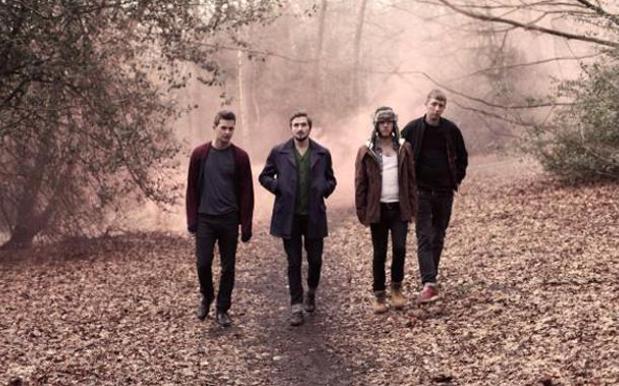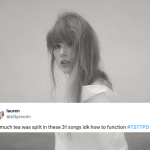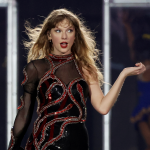
Following the release of their fantastic sophomore LP Two Dancers, Wild Beasts pulled what is colloquially known as a “Radiohead circa Kid A” and swapped their guitars, amplifiers and pedals for laptops, drum machines and triggers. The change is immediately noticeable in third studio LP Smother where the quartet’s charming vaudeville shtick finds new surrounds in meandering synth flourishes, programmed drum beats and barely-there pads. Last week Pedestrian caught up with frontman Hayden Thorpe to discuss the band’s new direction, organic electronica and the benefits of recording on your internal laptop microphone.
Lead single Albatross has more of an electronic vibe, is that indicative of the whole record? In texture and tone we felt it was most symbolic of our working process. The production of Albatross was really a learning curve for us. The guitar part was written, well not written, recorded straight into a laptop in my front room. That process was great because we realised in making this record that we wanted to make something of beauty but also realised that the quiet imperfection and accidents of recording something live into a laptop was beautiful too. That was a real guiding force with how we decided to go with the album.
What kind of software did you guys explore? It’s as simple as Logic. I don’t think Logic is underestimated, it is a really powerful musical tool…Its main competitor is Pro Tools, but Pro Tools costs a month’s wage and takes three or four days to be able to make a noise out of. Whereas Logic costs a week’s wage and you can make a noise within five minutes. You can make a recording and play it back to yourself and I think that’s a huge difference. That was just a huge learning curve really, just to actually listen to ideas back – to actually have a record of it and listen to it back rather than having to try to piece together a composition via memory, that made a big difference.
Did you guys work remotely from each other as a result of that process or were you all in the same room? It opened up both doors. It meant we worked more remotely than ever but it also meant when we came together we worked more collectively than ever. It meant there were no longer any sort of standards, no longer any ‘no no’s’, we no longer had an accepted way of doing things and that was really liberating. Some of the songs on the album came together literally in five minutes collectively and some songs were slaved over over 18 months. In the end we learned that what we felt was right was the best thing rather than maybe what sounded most correct, it was all about the spirit of it.
That kind of seems counter to a more electronic songwriting process… It’s like that Photoshop syndrome. I feel like Photoshop, which is a software device, can correct human blemish. It can correct what is seen as an imperfection but often it takes away the most endearing, unique qualities about the person and we realise that’s something music can also do. Quantizing can take away the natural human character that can make music most endearing. We felt like there was a buffer between these two things and we didn’t want to restrict ourselves with this buffer during the realisation of an idea and that often meant including crude bits and accidents and imperfection.
How are you translating a more electronic feel to the live environment? With difficulty. Having to learn new equipment, amplifiers, triggers, loop machines but that’s really exciting for us. There isn’t anything worse than keeping on teaching yourself what’s already worked for us. It’s more rewarding to do things that could actually easily go wrong. It’s more dangerous and I think there’s a bravery to using things you don’t quite know how to use but there’s an excitement to that. I think if we kept on hammering out guitar songs we’d very easily start to be disillusioned with what we’re really about. The beauty of using new equipment is that it throws back ideas at different angles, it deflects from different angles… and I think it’s quite beautiful being daring. A lot of music nowadays is very, very safe and very calculated and very knowing of itself and I think really it’s our responsibility to not give up your faith… All of our favourite artists blurred that line between being a disaster and when you tread the line between near-disaster the result in triumph is always sweet.
Can touch on the bands you admire that do use equipment in that way? Animal Collective are a good example. Merriweather Post Pavillion is an album that’s made with dynamics and ability and knowledge and it was a really brave thing to do. Also on our label Four Tet they is an amazing example of someone who’s known to sample and and to create something you could loosely call ‘organic electronica.’ It’s electronic sounding music but with an identifiable, viable human element…
Did you approach vocal melodies in a different way? I think it’s really important to maintain that direct humanness… I think if anything we’re being more daring and I think you want the vocals to be more raw and unruly and more vulnerable. It’s just that human element that I think is so vital to music and more people should try to come to rely on it because it translates emotion in a really vital, human way. It addresses things in the everyday current and for that vocals are always really important. There’s songs, don’t get me wrong, the process changed but the songs always started out as actual songs. It’s just the process that maybe changed the shape of their skeleton more than before. The skeleton remains the same but the flesh changes.
What’s your proudest moment on this record? I think probably a song like “Loop The Loop”. I think for me I’m very proud of that in that I know when I listen to it that it wouldn’t exist without the two albums that have been made before this album and the understated ability to have some insanity left in a song is really important. To know how to be able to treat a song like this and get away with it so yeah I think “Loop The Loop” displays how far we’ve come.
“Smother” hit shelves May 13.
Title Image Provided by Wild Beasts



